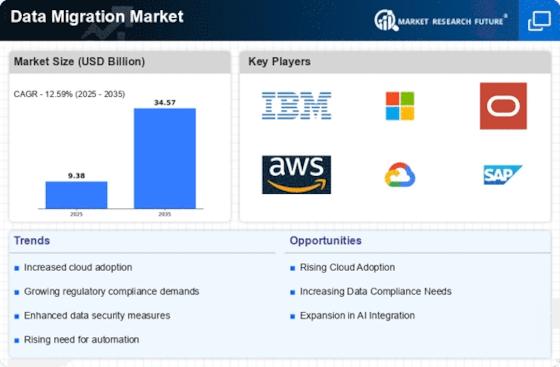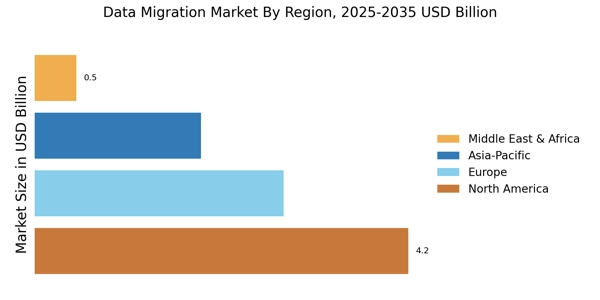Growing Importance of Data Analytics
The Data Migration Market is increasingly shaped by the growing importance of data analytics. Organizations are recognizing that effective data migration is crucial for harnessing the power of analytics to drive business insights. As companies migrate data to advanced analytics platforms, they can derive actionable insights that inform strategic decision-making. The analytics market is projected to expand at a compound annual growth rate of around 10%, underscoring the need for efficient data migration processes. This trend suggests that organizations will prioritize data migration initiatives to ensure that their analytics capabilities are not hindered by outdated data systems. Consequently, the Data Migration Market stands to gain as businesses invest in migration solutions that facilitate access to real-time data for enhanced analytical capabilities.
Regulatory Compliance and Data Governance
The Data Migration Market is significantly influenced by the increasing emphasis on regulatory compliance and data governance. Organizations are compelled to adhere to stringent regulations regarding data privacy and security, such as the General Data Protection Regulation (GDPR) and the California Consumer Privacy Act (CCPA). These regulations necessitate the migration of sensitive data to secure environments, thereby driving demand for data migration services. As companies strive to ensure compliance, they are likely to invest in robust data migration strategies that facilitate secure data transfer while maintaining data integrity. This focus on compliance not only enhances organizational reputation but also mitigates the risk of potential legal repercussions, further propelling the Data Migration Market forward.
Rise of Hybrid and Multi-Cloud Environments
The Data Migration Market is witnessing a notable shift towards hybrid and multi-cloud environments. Organizations are increasingly adopting these models to leverage the benefits of both public and private cloud infrastructures. This trend necessitates the migration of data across various platforms, creating a robust demand for data migration services. As per industry forecasts, the hybrid cloud market is expected to grow at a rate of 15% annually, indicating a substantial opportunity for data migration providers. The complexity of managing data across multiple environments requires specialized migration solutions, thereby enhancing the relevance of the Data Migration Market. Companies are likely to seek expert assistance to ensure seamless data transfer and integration, further driving market growth.
Increased Demand for Data Management Solutions
The Data Migration Market experiences heightened demand for efficient data management solutions. Organizations are increasingly recognizing the necessity of migrating data to modern platforms to enhance operational efficiency. As businesses accumulate vast amounts of data, the need for effective data management becomes paramount. According to recent estimates, the data management sector is projected to grow at a compound annual growth rate of approximately 12% over the next five years. This growth is likely to drive investments in data migration services, as companies seek to streamline their data processes and improve accessibility. Consequently, the Data Migration Market is poised to benefit from this trend, as organizations prioritize the migration of legacy systems to more agile and scalable solutions.
Technological Advancements in Data Migration Tools
The Data Migration Market is significantly impacted by technological advancements in data migration tools. Innovations such as automation, artificial intelligence, and machine learning are transforming the way data migration is conducted. These technologies enable faster, more accurate, and cost-effective migration processes, appealing to organizations seeking to minimize downtime and operational disruptions. The market for data migration tools is expected to grow substantially, with estimates suggesting a growth rate of approximately 14% over the next few years. As organizations increasingly adopt these advanced tools, the Data Migration Market is likely to experience a surge in demand for migration services that leverage cutting-edge technologies. This evolution not only enhances the efficiency of data migration but also positions organizations to better adapt to changing business needs.


















Leave a Comment